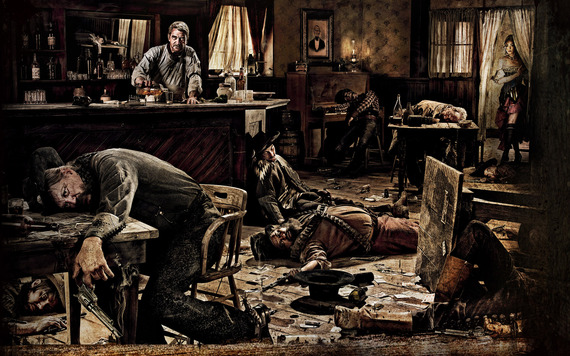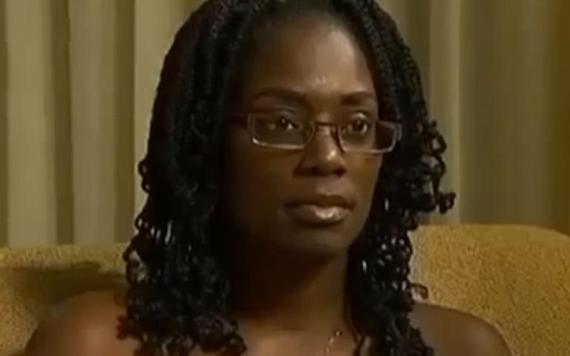We hear it after every mass shooting: "Guns don't kill, people kill," as though actually holding a pistol was in any way the emotional equal to cranking up the nerve to club someone to death with a baseball bat or stab them with a knife. There's a reason we call those little actuators "triggers." Add alcohol or insanity and stand well back.
The original intent of the Second Amendment to the U.S. Constitution was to allow citizens to arm themselves against takeover by colonial powers. In those days serious firepower looked like a smootbore flintlock musket. But those days have passed into our frontier history. The real colonizers today are the weapons lobbies and manufacturers that shamelessly make money from the slaughter of other people's children. Even the British at their worst didn't go that far.
Part of the problem is that we Americans tend to be literal-minded, if conveniently so. Look at all the people who say the entire Bible should be taken literally. They say it, but they don't live it because they can't. Some of it bears literal interpretation: "love your neighbor as yourself" seems like a useful idea. So do "turn the other cheek," "forgive our debtors," and "do not kill." But unless you have no problem with self-dismemberment, owning slaves, selling your daughter into slavery, marrying your rapist, burning bulls on altars, stoning adulterers to death, giving coins to men named Caesar, executing every neighbor who works on the Sabbath, and eating flesh and drinking blood, you will keep to what has stood the test of time and let the rest be allegorical. (How to do that was shown us in the Book itself by a nonviolent and egalitarian master of the parable. His name was Jesus of Nazareth.)
The Second Amendment says we have "the right to keep and bear arms." The literalist includes cheap handguns and high-powered assault rifles even the police are afraid of--and ignores the part about "a well-regulated militia." (Evidently the line is drawn at atomic weapons in spite of "outlaw them and only the criminals will own them.")
The primary problem, however, is that unscrupulous death merchants spend some of their profit trying to convince the rest of us of crazy things that support their parasitism. The "realist" "survivalist" armed to the teeth betrays a lamentable lack of criticality toward the businesses he enriches with his hard-earned money, nor does he seem to realize that the National Rifle Association spends nearly half its yearly revenue lobbying politicians.
Here are a few more facts--"smoking guns" if you like:
- 4.5 million firearms are sold in the U.S. every year. (Bureau of Alcohol, Tobacco, Firearms and Explosives)
- In 2012, 8,700 handguns and 1,528 rifles were recovered from crime scenes. (ATF)
- 60 percent of U.S. homicides are committed with a gun. (Small Arms Survey, Geneva)
- 100,000 Americans a year are wounded or killed by guns. (U.S. Centers for Disease Control and Prevention)
- Homicides by gun per year in Japan: 50. In Germany, Italy, France, and much of Europe: less than 150. (IANSA)
- More Americans die in two years from gun violence than were killed in the Vietnam War. (U.S. Dept. of Defense)
- Mass shootings in the U.S. come to about 2/month since 2009. (FBI)
How could anyone in their right mind claim that guns make us safer, especially by comparison with nations that outlaw them? Yet, "Guns don't kill, people kill." Especially people with guns. "If anyone else had been armed they could have stopped the shooter." In the Wild West that used to be known as a gunfight.
But let's make the modest proposal of applying this "logic" to a few other areas of life and see where it gets us:
The problem is not that too many people get scammed by crooked bankers and real estate agents, the problem is that the buyers don't have enough practice lying right back to them and matching their dishonesty.
The problem isn't that about four hundred companies own most of the world, it's that the rest of us are not equally greedy.
The problem isn't being cut off by thoughtless drivers, it's that more of us don't respond by running them off the road.
The problem isn't rude coworkers, it's that we haven't beaten them into submission.
The problem isn't rogue nations, it's not enough bombs and missiles to obliterate entire populations.
The problem isn't that too few citizens vote, it's that politicians and captains of industry don't ignore the public more consistently.
The problem isn't that monocrop agriculture sells us slave-harvested food laced with poisons, it's that we don't add our own neurotoxins into the mix.
The problem isn't poverty, it's that food and rent prices haven't gone high enough to exterminate the poor.
The problem isn't that the polar ice caps are melting, it's that American industry hasn't built heaters big enough to melt what's left.
The problem isn't a malfunctioning computer, it's our failure to smash it with a keyboard until it starts working again. Same with any piece of equipment.
Do those tactics seem sane or reasonable to you? Does meeting force with more force ever get us what we want or need?
In Swift's "Modest Proposal" of 1792, he recommended that the poor Irish of his time make money by selling their children to the wealthy. He meant this as a sarcastic jab at the callousness of the super-rich. In our time we have accomplished his proposal for real by handing over our flesh and blood to the calculating manufacturers of sudden, explosive death.
What is the alternative?
Last year Michael Brandon Hill, a mentally ill 20-year-old, put on black garments and entered an elementary school in Georgia. He carried an AK-47 assault rifle and just under 500 rounds of ammunition. He had purchased the rifle and bullets legally; Georgia law did not even require a permit. On his cell phone was a photograph of himself posing with the gun.
Firing off a round, he ordered bookkeeper Antoinette Tuff to the floor. When the police arrived he exchanged shots with them while telling her he had nothing to live for.
She responded by telling him about her recent divorce, her disabled child, and a relatively recent suicide attempt. "Look at me," she said; "I'm still living." He told her that his mother had died, he'd been in trouble with the law, and his medication prescription had expired.
She talked with him until he set down the rifle, handed over his phone, and allowed her to go on the school intercom to tell everyone he was sorry. When the police entered he went with them peacefully.
No gunfight, no casualties, no lingering trauma, just Tuff love and shared vulnerability and a troubled young man putting down his gun. She even calmed down the 911 dispatcher, who heard her tell Hill, "I'm proud of you" as he surrendered. The teller of parables would have approved.


